21+ Sample Employee Resignation Letter
-
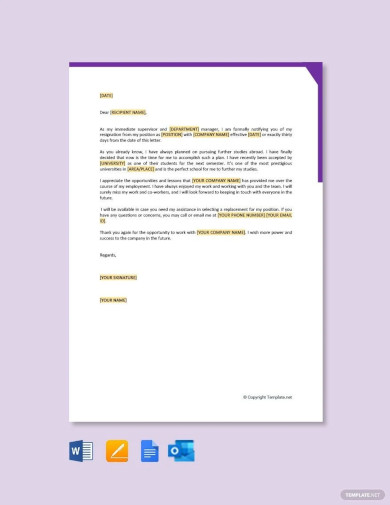
Employee Resignation Letter to Manager
download now -
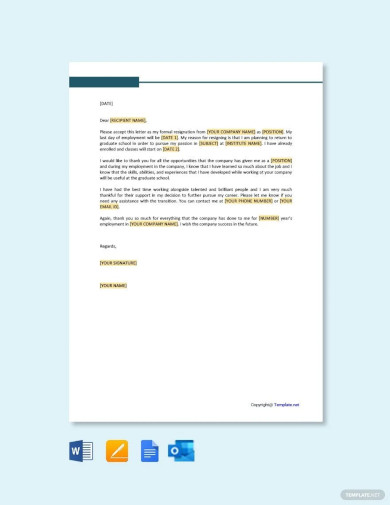
Company Employee Resignation Letter
download now -
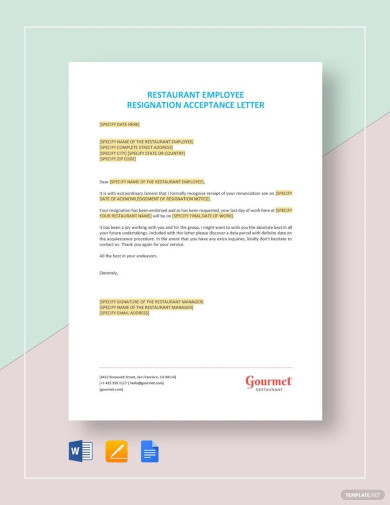
Restaurant Employee Resignation Acceptance Letter
download now -
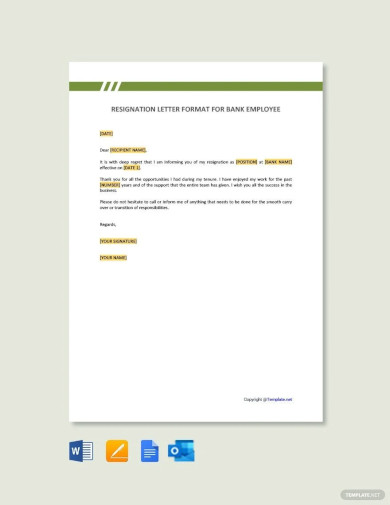
Resignation Letter Format for Bank Employee
download now -
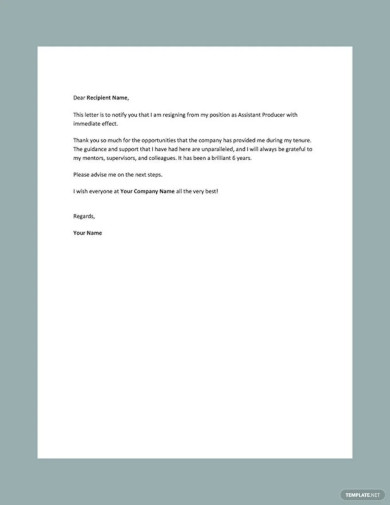
Employee Resignation Letter
download now -
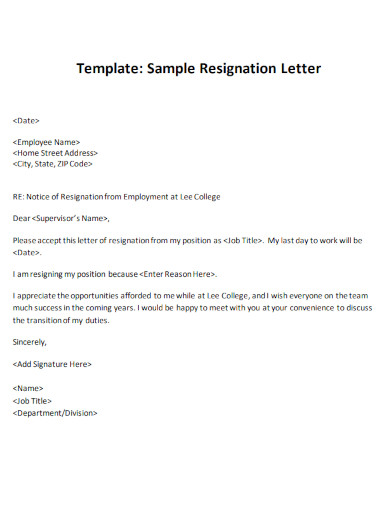
Sample Employee Resignation Letter
download now -
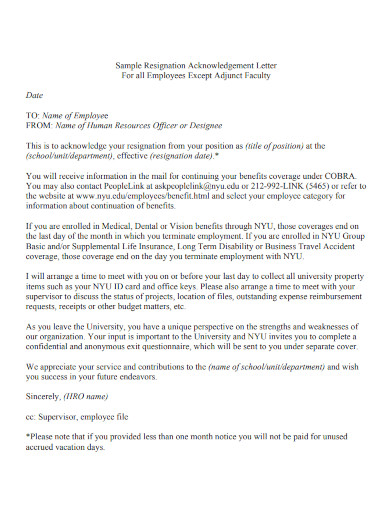
Employee Resignation Acknowledgement Letter
download now -
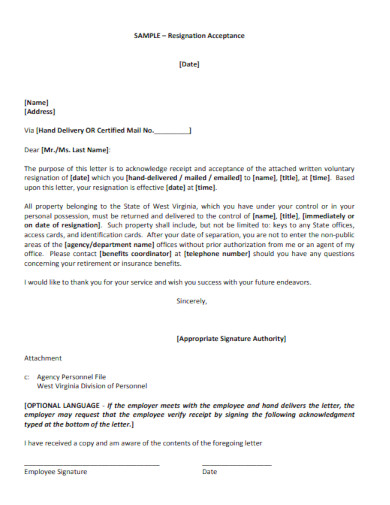
Employee Resignation Acceptance Letter
download now -
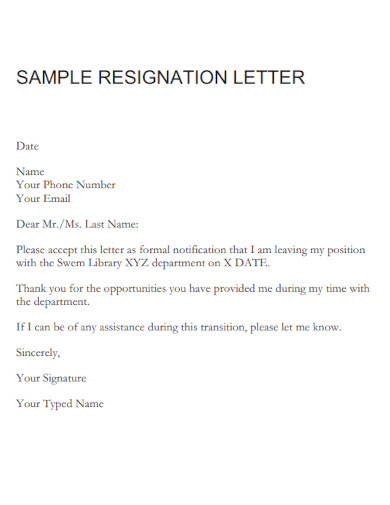
Employee Resignation Basic Letter
download now -
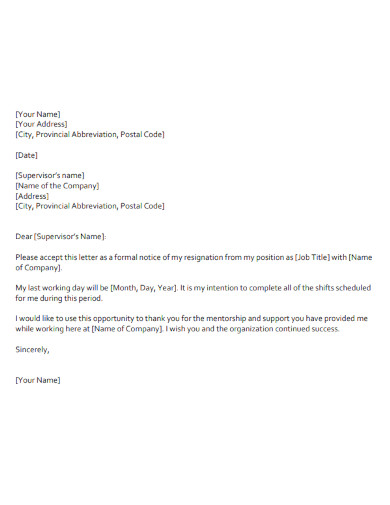
Employee Resignation Letter Format
download now -
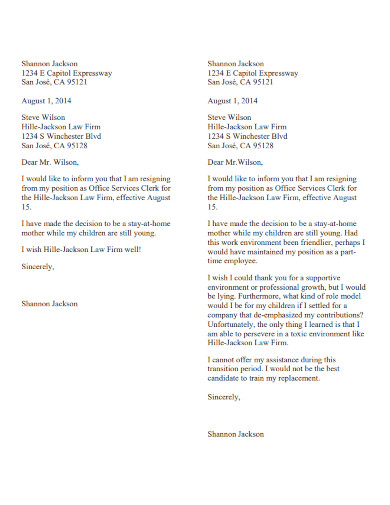
Office Employee Resignation Letter
download now -
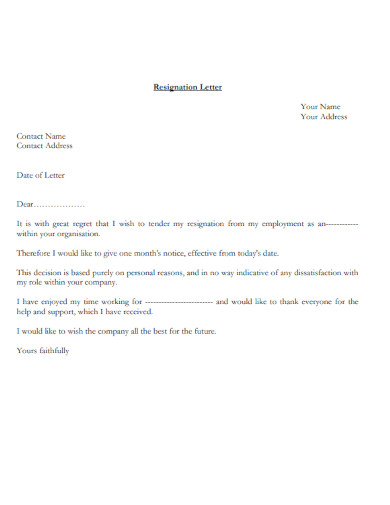
Job Employee Resignation Letter
download now -
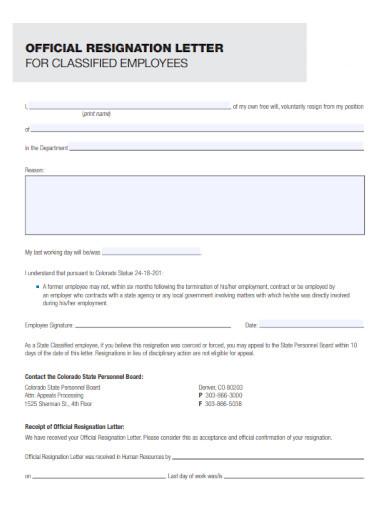
Classified Employee Resignation Letter
download now -
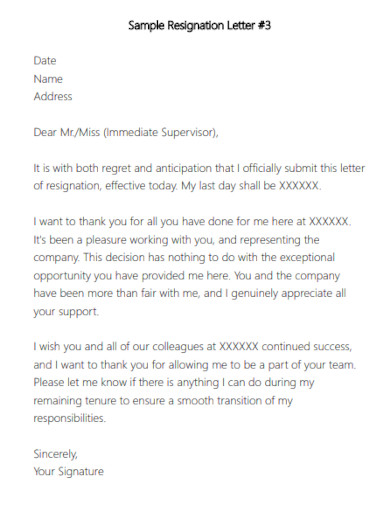
Employee Immediate Resignation Letter
download now -
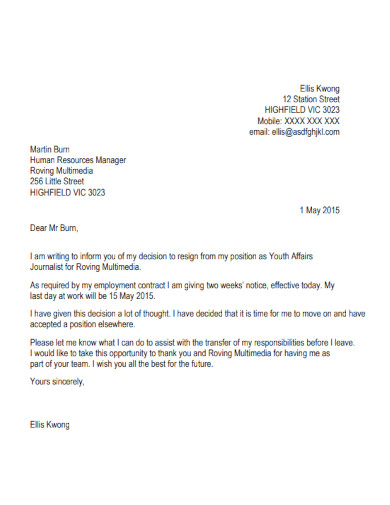
Multimedia Employee Resignation Letter
download now -
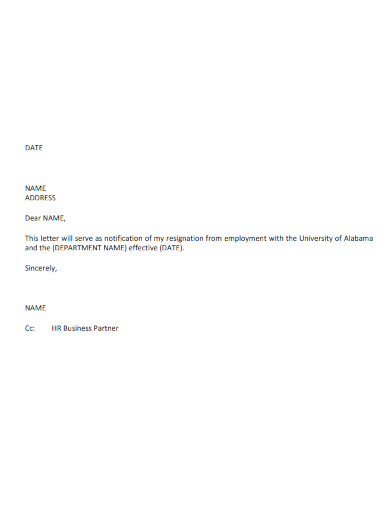
University Employee Resignation Letter
download now -
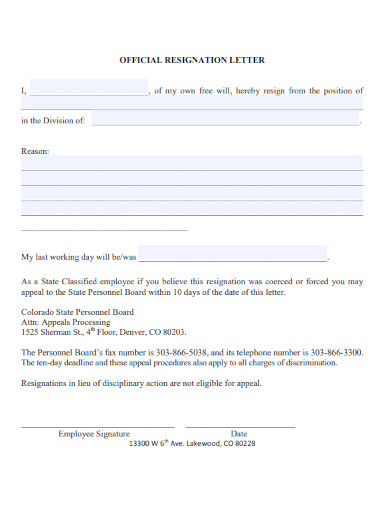
Official Employee Resignation Letter
download now -
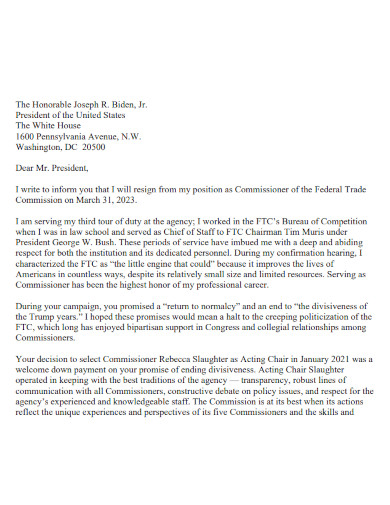
Letter of Employee Resignation
download now -
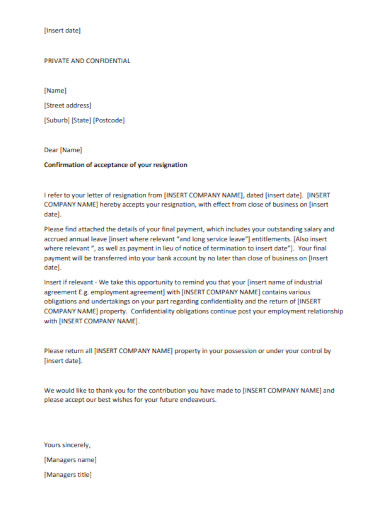
Employee Acceptance of Resignation Letter
download now -
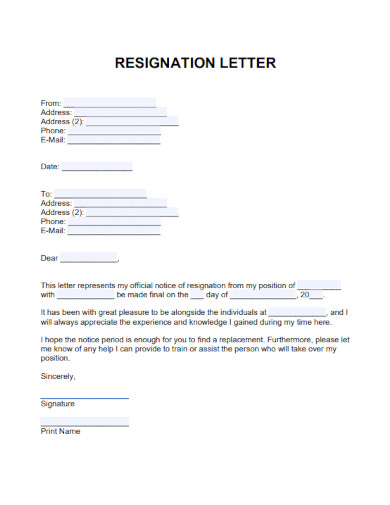
Employee Blank Resignation Letter
download now -
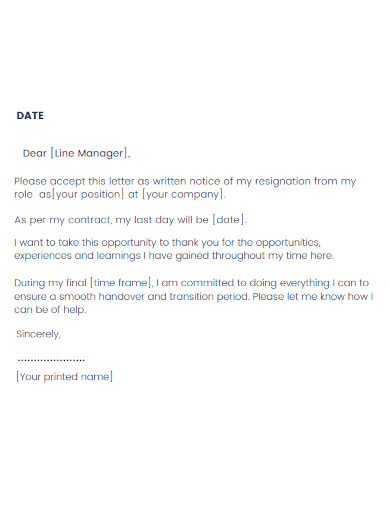
Employee Resignation Notice Letter
download now -
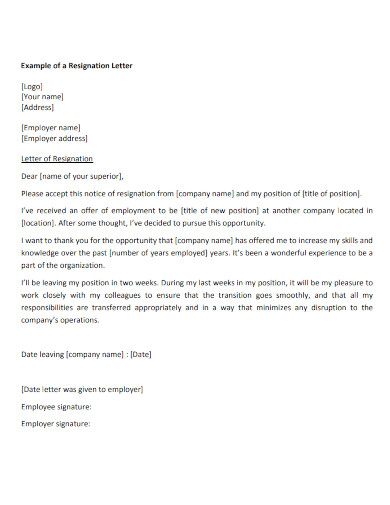
Example of Employee Resignation Letter
download now
FREE Employee Resignation Letter s to Download
21+ Sample Employee Resignation Letter
What Is a Resignation Letter?
Benefits of Resignation
Tips Before Resigning From Your Job
How to Quit a Job Professionally
FAQs
What is the best time to resign?
Why is it important to keep your resignation letter positive and professional?
How much is the final pay?
What Is a Resignation Letter?
A resignation letter is a formal method to end your position. And regardless of your relationship with your current manager or community, having the details in writing will facilitate a seamless transition. Your resignation letter should convey your intent to resign from your current position, along with information about your last expected date of employment and other pertinent details regarding the progression of your responsibilities. Keeping a positive connection with your former employer requires a well-written resignation letter.
Benefits of Resignation
Resigning from a job can have various advantages depending on circumstances and departure motivations. Before leaving, evaluating your situation thoroughly and weighing the potential benefits against any challenges and uncertainties is essential. Before making this significant decision, ensure that you have a well-defined plan and a firm grasp of your reasons for resigning. Listed below are some of the advantages you may enjoy if you decide to resign from your job.
Tips Before Resigning From Your Job
Multiple resignations are among the most significant decisions you will make in your lifetime. Determining when it is time to move on requires deliberation. Possibly, you have met the limit of your growth. Alternatively, your dissatisfaction with the job and environment has reached the point where you are prepared to resign. Regardless of your motivations, you must contemplate your decision and discuss it with those your resignation may affect, such as your family. Here, we discuss essential factors to consider before an impending exit, so you can avoid additional obstacles if you need to withdraw your resignation.
1. Verify Your Financial Security
If your work experience has deteriorated to the point where you’re ready to quit, it can be tempting to hand in your notice immediately. However, this rash decision could place you in a difficult financial situation. Rather than rushing into the decision, ensure you fully comprehend your finances by factoring in your mortgage agreements, insurance premiums, childcare expenses, and other expenses. Additionally, anticipate that your job search may take longer than expected. Then, based on your current savings, estimate how many months you can survive without an income.
2. Examining the Market Outlook
Quitting your employment is difficult, mainly when the market outlook is uncertain. While you may be dissatisfied with your current position, resigning just before an industry or economic downturn would be imprudent. While it may be impossible to predict the future, you should investigate prospects and discuss the industry’s short-term outlook with colleagues. This may prevent an extended period of unemployment during which you become progressively destitute.
3. Consider the Merits
There is no lack of reasons why quitting your job might be the best option. For instance, you may be dissatisfied with your income, professional development plan, or challenging but inconvenient work hours. If you are confident in your ability to locate a new job quickly, quitting your current position and putting yourself in a better place may be ideal. However, you may discover that the risks outweigh the benefits of quitting your job.
4. Consider the Positives
Almost every profession has aspects that frustrate employees. You may work longer hours than you would like or feel underpaid and overburdened compared to your coworkers. However, before quitting your employment, it is prudent to consider any potential benefits. For instance, you may have an excellent rapport with your coworkers, or your initiatives may provide exceptional job satisfaction. Are these positives sufficient to continue? You alone will know.
5. Consider Your Career Objectives
Resigning at the correct time could be beneficial to your career prospects. If you’ve only been at a job briefly, leaving it may require you to explain an awkward gap on your resume. An unexpected resignation could prompt coworkers to question your dependability in a particularly close-knit industry. While these factors should not prevent you from leaving a position that makes you miserable, it is essential to consider the repercussions.
How to Quit a Job Professionally
Whether you’re leaving your job because you’ve accepted an offer from another employer, you’re relocating, or for another reason, deciding how to resign and break the news can be difficult. Knowing how to quit your position professionally will allow you to keep a positive relationship with your employer. Follow these steps to learn how to resign from your job professionally:
1. Start by Determining Whether the Time Is Appropriate
Knowing why, when, and how to leave your work will help you make the best choice, find new possibilities, and exit your current position with dignity. Even if you’re angry, take some time to thoroughly weigh the advantages and disadvantages of leaving your job. Consider speaking with your immediate supervisor to see if they can offer solutions if you feel underwhelmed or unfulfilled by your duties or workload. If you’re actively seeking another opportunity, holding off on leaving your current position might be preferable until you formally accept another offer to avoid an employment gap. Once you’ve made up your mind to quit, make sure to conduct yourself professionally and politely. Employers understand that employees occasionally desire to pursue new endeavours, and by running yourself properly, you can retain a relationship that could result in future possibilities.
2. At Least Two Weeks’ Notice Is Required
The standard notice to give an employer before leaving is two weeks. However, if you have signed an employment contract, you must adhere to any laws regarding the length of notice. Depending on your availability, you may be willing to stay longer than the standard two-week period, particularly if your new job begins after several weeks or you are transitioning to self-employment. Include this information in your resignation letter, regardless of the length of notice you provide.
3. Write a Letter of Resignation
Write a concise letter of resignation explaining your decision. Determine the appropriate recipient of your resignation letter, such as the human resources manager, before you start writing. In addition, sharing your reason for leaving a job is not required, but it can be helpful for your supervisor and other leadership personnel to comprehend. This is best accomplished through a conversation with your human resources manager. Sometimes, a human resources (HR) representative may schedule an exit interview to inquire about your time with the company, the reasons for your departure, and your thoughts on company policies, culture, and benefits. Prepare what you intend to say in this meeting so that you can provide constructive feedback. Remember that the objective is to maintain positive relationships with former employers, so it is crucial, to be honest while remaining professional. Even if your HR department does not schedule an exit interview, contemplate contacting a team member to discuss your feedback evaluation and reasons for departing. If your decision to quit is based on issues with particular employees, HR can work to resolve the situation.
4. Meet With an HR Representative
Consider putting up a one-on-one meeting with your employer rather than email them announcing your resignation or letting them know you are leaving HR. Depending on how well you get along with your boss, this can be a great chance to express your gratitude for the opportunities they’ve given you and work together to develop a strategy for finishing any outstanding projects before you go. Although arranging a face-to-face encounter is polite, it’s not usually necessary. You should speak with the HR division first if you don’t get along well with your boss or are worried about how they could react. Whatever method you choose to notify your coworkers, prepare, print, and sign an official resignation letter. Completing this important HR document can help the leave process run more smoothly because organizations typically require it.
5. Work to Conclude and Transition
You likely have two weeks remaining in your job after notifying your employer of your resignation before you depart formally. Complete ongoing tasks during this time, and collaborate with your manager to identify a replacement for any functions you won’t be able to finish during your notice period. Keep track of your daily work plan, where you’ve stored critical files, how to use different pieces of equipment, and other details relevant to your position. This ensures a smooth transition for whoever takes your place.
FAQs
What is the best time to resign?
Frequently, it is advantageous to resign during the final shift of the workweek, as this decision can be advantageous for both you and your employer. For instance, you can complete all necessary duties before starting a new week to avoid delegating them to other coworkers.
Why is it important to keep your resignation letter positive and professional?
Resignation letters are essential to the employee-employer relationship and can facilitate a seamless transition while preserving a positive employer-employee rapport. They should be written respectfully and professionally and submitted directly to the employee’s manager or supervisor.
How much is the final pay?
The final payment is the sum of the employee’s regular pay, bonuses, and unpaid rights. Separation pay, on the other hand, is an additional payment made to employees after their working relationship and is not based on any particular entitlements.
No matter what your job is, be polite in your resignation letter. Explain why you’re going and who you’re telling. Employers care a lot about your gratitude and support as you leave, and the last thing you want to do is leave on a bad note, even if you’re going for bad reasons. Using these resignation letter samples and forms as a guide, you can protect your professional relationships and network as you move on to your next job.
